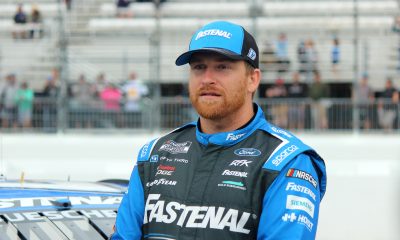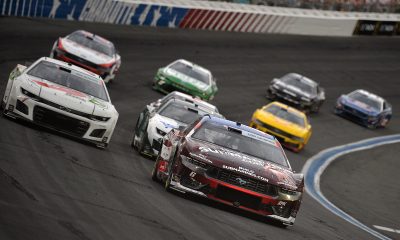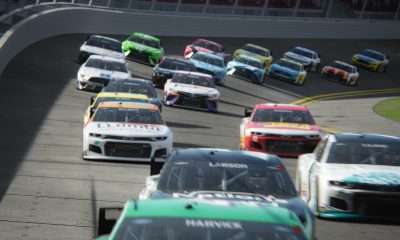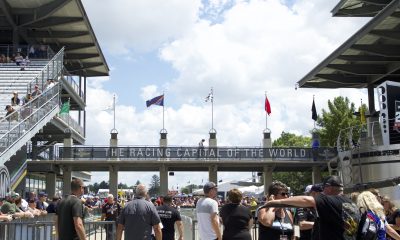
When it comes to qualifying in the early-to-mid 2000s, Ryan Newman’s NASCAR legacy was etched into stone. (Photo: Sam Draiss | The Podium Finish)
In this final part of a three-part series focusing on NASCAR’s 75 Greatest Drivers, I focus on my final six picks that I had to think real hard on who’d make the cut. Please check out the previous columns where I highlight the 12 new NASCAR Cup Series champions after 1998 and seven drivers who proved that you don’t need to become a Cup champion in order to leave an incredible mark in the sport.
The Grand Debate
I’ve covered 19 out of 25 drivers who should be added to the sport’s Greatest Drivers list. Now, it’s the grittiest part of the list where I have to defend my case on the final six drivers that made my list. Before we dive into those six racers, here are the drivers I considered including on my 75 Greatest Drivers list, but missed the cut.
However, I had tremendous reservations and may not have enough leverage because of the other six racers’ accolades and the impact they’ve made in NASCAR. The following drivers labeled in bold were, at one point, on my list before finalizing the project.

Bodine won a total of 37 NASCAR national touring divisions and two Truck Series titles (Photo: Luis Torres | The Podium Finish).
- Todd Bodine
- Justin Bonsignore
- Johnny Benson, Jr.
- Bill Rexford
- Phillip Morris
- Mike Skinner
- Jim Paschal
- Kasey Kahne
- Frank Kimmel
- Iggy Katona
- Tony Hirschman, Jr.
- Austin Dillon
- Reggie Ruggiero
- Lee Pulliam
- Andrew Ranger
- Ray Elder
- Tim Steele
- Ruben Garcia, Jr.
- Ward Burton
- Tyler Reddick
- Sterling Marlin
- Ricky Stenhouse, Jr.
- Jamie McMurray
As you can tell, I had to make tough decisions. Some ARCA or regional guys and multi-time Xfinity Series champions were considered for a brief time. But in the end, here are the six I find more worthy of NASCAR acknowledging them should they do a list.
Matt Crafton
This selection was tough to make because while he has three Truck Series titles, there are some sore spots.
His third title from 2019 comes up as a strike against Matt Crafton’s status of being the sport’s elite because he went winless. Not just that, he did so in the playoff format that emphasizes winning above anything else. Yet, he finessed the system via consistency was enough to hoist the title.
Another case is the fact he’s only won 15 times and took him until his eighth full season to get a win to begin with. They are valid cases to favor Todd Bodine or Johnny Benson, Jr. instead.
I get it, but three series titles do carry strength.
Additionally, Crafton has finished in the top 10 of points each of the last 16 straight seasons. The sport’s senior driver has failed to finish in the top 10 just four times, which provides an underrated element for Crafton.
Just under 60%, Crafton has finished in the top 10 a total of 312 out of his 521 starts. At the end of the day, consistency is paramount in the sport and Crafton is one of the better racers in that category. Especially in the Craftsman Truck Series.

Crafton won his third Craftsman Truck Series tile in 2019 (Photo: Chris Graythen | Getty Images via NASCAR Media)
Carl Edwards
With 44 national touring wins, Carl Edwards is one of the sport’s most unique personalities. Some may classify him as polarizing while others see him as a fan favorite. More so with his demeanor and unforgettable backflips after winning a race.
Edwards’ highest accolade was cruising his way to the 2007 Nationwide Series title, but he also scored 28 Cup Series wins from 2005-2016.
Unlike Denny Hamlin, Edwards didn’t quite have the accolades which puts a knock on his career. Yes, Edwards won the Southern 500 and Coke 600, but having 20 fewer wins than Hamlin shows the kind of careers they’ve had.
Multiple times, Edwards came up short of winning the title with some defeats more crushing than others.
He lost the 2011 title via a tiebreaker in wins as Edwards had one to Tony Stewart’s five (all in the Chase). Five years later, a block on Joey Logano that went south became Edwards’ final moment in the sport. His sixth and final top-five points finish ended in heartbreak and he retired weeks later.
Edwards still makes my list due to what he was able to do in all three divisions. He was a fierce competitor that at times was willing to put it on the line when needed. That’s invaluable enough to make my cut.

The first of many backflips in the Cup Series for Edwards after winning at Atlanta in 2005 (Photo: Jamie Squire | Getty Images via NASCAR Media).
Ryan Newman
Let’s face it, A.J. Foyt’s post-Wood Brothers career was rather putrid. Yet, what he was able to do beforehand was good enough to make the 50 Greatest Drivers list. Ryan Newman’s Cup career is somewhat familiar.
Fridays from 2002-05 became must-watch television because of Newman’s terrific qualifying skills. Out of his astonishing 51 Cup poles, 34 of those came in that time. Fans would go out of their way to pack some of the stands just to see if Newman could set a new track record or not.
If anyone was faster than Newman, it felt like a win. That’s how amazing Newman was in that period. Drivers had to outperform the No. 12 Alltel Dodge on Fridays before shifting onto the race itself.
Race days didn’t translate into wins as he won from the pole just five times. Newman is more known for his horrific crashes and extreme inconsistencies rather than his race craft, which I’d imagine people will go against being considered as the sport’s 75 greatest racers.
Newman is the king of hard racing. It didn’t matter if it was for the win or 22nd, a racer must earn that position by fighting against “The Rocket Man.” It has rubbed drivers the wrong way – just ask Jimmie Johnson or Joey Logano. It’s a trait that isn’t meant to please folks, and yet it’s his greatest trait as a competitor.
The Purdue graduate came close to winning the 2014 championship, finishing one spot behind Kevin Harvick at Homestead.
How did Newman get into the Championship 4? By moving Kyle Larson out of the way at Phoenix to knock Jeff Gordon out of the title picture. Phoenix was the site of his 18th and final career Cup win in 2017 via pit strategy.
His other career highlights include winning the 2008 Daytona 500 and the 2013 Brickyard 400, and his eight wins from 2003.
Remember this, Newman had seven DNFs to Kenseth’s two in 2003 – he was very inconsistent (seven finishes of 36th or worse), and people may look at his wins being more about fuel mileage than dominance.
Those are valid reasons for some people to be against Newman making the cut. But his qualifying prowess and consistent top-10 finishes are strong cases of being one of the better racers of his time.

“The Rocket Man” in victory lane at Indianapolis (Photo: Jerry Markland | Getty Images via NASCAR Media).
Jeff Burton
I had to really think about Jeff Burton more than I should have. What makes him 75 Greatest Drivers material? What makes him more valid than Bodine, Benson or even Kasey Kahne?
I’m going to bring up Geoff Bodine, Ernie Irvan and Harry Gant here. Retroactively, all three may be viewed by newer fans as “mid” racers, which they weren’t for a period of time.
For Burton, he was no slouch in the Cup Series, and his 21 wins prove it. Unlike his older brother Ward, Jeff was able to put together more consistent seasons in spite of not having as many Crown Jewel wins as Ward.
This was evident when Jeff finished in the top five of points in four straight seasons (1997-2000), a period people tend to ignore quite a lot. The No. 99 Exide Ford was a car that wasn’t ever counted out of a strong result.
Even during his first few seasons at Richard Childress Racing, Jeff was still a guy to keep an eye on for a strong result. While his accolades aren’t as strong as most people on my list, Jeff has a valid case of making the 75 Greatest Drivers.
It’s the lack of wins late in his career that would keep folks from feeling confident about Jeff’s career. This, too, is a valid case against him making the Hall of Fame, but we’re only focusing on the sport’s best drivers. Jeff makes my cut in large part of his consistency, especially during his time with Jack Roush.

Burton in victory lane after the Duels at Daytona in 2011 (Photo: Jerry Markland | Getty Images via NASCAR Media).
Sam Ard
A driver that didn’t make the sport’s 50 Greatest Drivers in 1998 was Sam Ard, whose career was superb. The unfortunate case for Ard is that he was superb in the Busch Series in a short period of time.
Ard had a career-ending crash at Rockingham in 1984 which put a damper on his second straight series title. Perhaps that’s the key reason why he didn’t make the list in 1998, but as years have gone by, no question Ard belongs on such list.
In his three years in Busch, Ard won 22 races, 24 poles and racked up 67 top-fives in 92 starts. It’s amazing that a guy was that strong in such a period in any national touring division. Many would kill for a run like Ard’s.
Whether or not Ard would’ve had a strong Cup career is unknown as his dominance of the Busch Series was in his 40s. But I don’t think you can go against Ard being worthy of the 75 Greatest Drivers in NASCAR history. In my eye, there’s no true case against it.

In just three seasons, Ard went on to win 22 times in the Busch Series (Photo: RacingOne via NASCAR Media).
Larry Phillips
Last, but certainly not least, is Larry Phillips – a man that drivers and folks I’ve met over the years vouch for to make the Hall of Fame. I totally see their reasonings behind it, but should he not make it, I think being considered as one of the 75 Greatest Drivers is a huge honor.
Phillips made just one Cup start in 1976, finishing 13th. But as you’ve seen with my list, it’s more than just the Cup Series. For some folks, it’s more than just the national touring divisions.
Phillips was king in the weekly series, winning five championships with his craft being legendary in Missouri. His wins are quite a mystery because he’s listed as winning 226 of 308 Winston Racing Series races. According to crew chief James Ince, Phillips is estimated of winning up to 1,000-2,000 total races.
If Phillips is racing, the race for second became all the talk because he was going to win the race. His 13 track championships across three states back up the claim, and it’s why in 2006, he was named one of the 25 best drivers in the Weekly Series.
The accolades speak for themselves; Phillips deserves to be considered as NASCAR’s 75 Greatest Drivers.

No matter what region of the Midwest it was, Phillips was tough to beat (Photo: Photo by ISC Images & Archives via Getty Images).
Conclusion
If and should NASCAR plan on updating its Greatest Drivers list to celebrate its 75th anniversary, it’s going to spark a debate. Many are no-brainers, but there are those who’ll die on a hill for one driver over another.
The list from 1998 showcases a diverse list of competitors who made the sport what it is today. What I hope people can take away from this is that NASCAR is more than just the Cup Series. It’s a celebration of the entire sanctioning body with racers leaving their mark one way or another.
Each racer’s legacy deserves a closer look and I hope the sport sees that if they want to recognize more racers over the past quarter century or even before that.
Throughout my young motorsports media career, my number-one goal is to be a personnel that can be flexible with my writing and photography in the world of NASCAR and INDYCAR. Content delivery is vital because this is my main passion and what keeps me going. On the side, I also do sports production ranging from Seattle Kraken hockey to the 2023 NCAA Women's March Madness. All for the love of the game. With four National Motorsports Press Association photography awards, I'm not slowing down anytime soon. Outside of media, I'm super vocal about my musical tastes that goes from Metallica to HAIM. At times, there might be some Paul Thomas Anderson and Southern California references in my social media.












